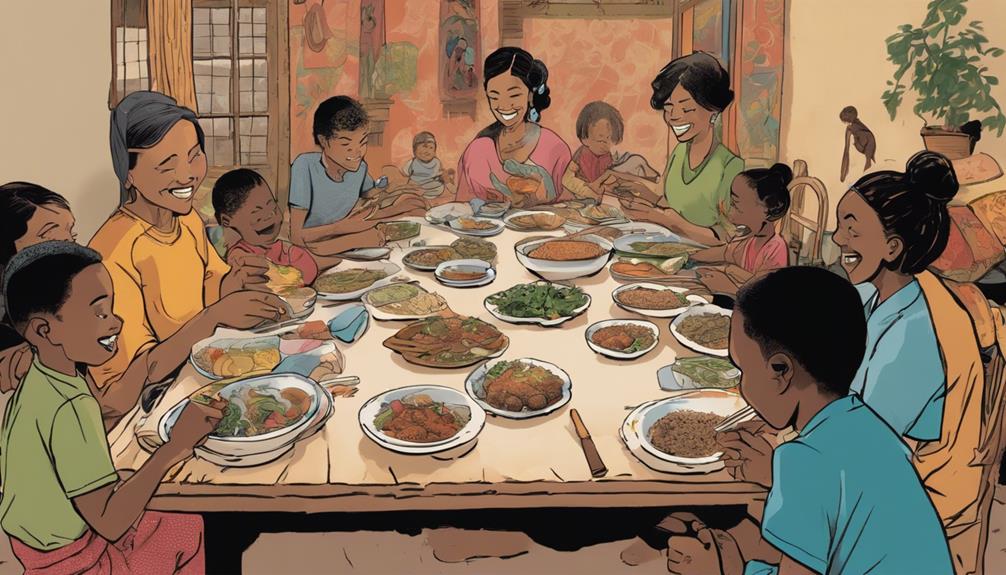Parenting Styles
Parenting Across Borders: American Parenting Vs Other Cultures
Glimpse into the fascinating world of parenting practices across cultures, where diverse values shape childhoods, and the surprises are just beginning.

Diving into parenting styles worldwide reveals that **different cultures** really value unique beliefs. From Scandinavian democracy to Korean respect, these ideas shape how parents guide their kids. In Norway, kids start state daycare early, but in Japan, they’re taught to be **self-sufficient** from a young age. Co-sleeping is the norm in many non-Western countries, whereas American parents lean towards separate bedrooms. Meal times also look different; French kids taste fancy dishes early, while in Japan, meals are more laid-back. Looking at these cultural differences offers a richer **understanding** of parenting methods and their impact on kid’s growth – and there’s a lot more to **unravel** in the fascinating world of global parenting.
Key Takeaways
• American parenting prioritizes independence, whereas many cultures prioritize building security and attachment in children.
• Co-sleeping is common in non-Western cultures like the Philippines and India, whereas American culture promotes independent bedrooms.
• French and Japanese parenting styles introduce children to sophisticated food early, promoting healthy eating habits, unlike restrictive or permissive approaches.
• Cultural differences in parenting impact children's perceptions of success, with Japanese parents emphasizing academic achievement and Norwegian parents focusing on independence.
• Teaching emotional regulation strategies, such as mindfulness and deep breathing, is crucial for raising emotionally intelligent children, and cultural influences vary in their emphasis on empathy.
Diverse Parenting Philosophies Across Cultures
Across cultures, a staggering array of parenting philosophies emerge, each shaped by unique cultural values and priorities that often diverge from the individualistic, success-driven approach that dominates American parenting.
As you explore diverse parenting philosophies, you'll notice that Scandinavian cultures prioritize democracy and children's rights, whereas Korean and Asian cultures emphasize obedience and academic achievement. In contrast, Spanish parenting focuses on social and holistic child development over academics.
These varying approaches to child-rearing highlight the importance of collective responsibility and community support in many cultures. Norwegian children, for instance, enter state-sponsored daycare early, while Japanese children are encouraged to be independent from a young age.
As global awareness of diverse parenting practices increases, you're likely to develop a more nuanced understanding of parenting worldwide. This shift in perspective can broaden your understanding of what it means to be a good parent, moving beyond American parenting values and embracing the richness of global parenting styles.
Co-Sleeping Vs Independent Bedrooms

As you explore diverse parenting practices, you'll encounter a significant variation in sleep arrangements, with co-sleeping being a common practice in many non-Western cultures, contrasting with the emphasis on independent bedrooms in Western societies like the US.
Co-sleeping, where parents share a bed with their babies, is a widespread tradition in cultures like the Philippines and India. In contrast, Western societies promote independent sleeping arrangements, often separating babies from parents around six months of age. This difference reflects fundamental cultural differences in parenting practices and beliefs about infant sleep arrangements.
| Culture | Sleep Arrangements | Emphasis |
|---|---|---|
| Non-Western (e.g., Philippines, India) | Co-sleeping (bed sharing) | Bonding, closeness, security |
| Western (e.g., US) | Independent bedrooms | Independence, self-soothing |
| Vietnamese, Japanese | Co-sleeping (hammocks, wicker baskets) | Bonding, security, closeness |
| American | Cribs, nurseries | Independence, self-reliance |
These differing approaches to sleep arrangements highlight the complexity of cultural differences in parenting practices. By understanding these variations, you can better appreciate the diversity of parenting philosophies across cultures.
Feeding Styles Around the World

Explore feeding styles around the world, and you'll discover a fascinating array of cultural approaches that shape eating habits and relationships with food from a young age. In France, for instance, children are introduced to sophisticated adult dishes early on, fostering a diverse palate. This approach encourages healthy eating habits by discouraging snacking between meals.
In contrast, Japanese and Finnish parenting styles adopt a relaxed approach to food, a stark contrast to the competitive nature often seen in the US. These varying approaches have a profound impact on the way children develop their eating habits and relationships with food.
By exposing children to a wide range of flavors and textures, parents can promote healthy eating habits and a more adventurous palate. Conversely, restrictive or overly permissive approaches can lead to unhealthy relationships with food.
As you explore feeding styles around the world, you'll gain a deeper understanding of the cultural nuances that shape our relationships with food and the lasting impact they've on our health and well-being.
Cultivating Independence in Children

In contrast to many other cultures, American parents often prioritize cultivating independence in their children from a tender age, shaping their little ones into self-reliant individuals. This emphasis on independence is a hallmark of American parenting, where children are encouraged to make their own decisions, take risks, and learn from their mistakes.
In contrast, many other cultures prioritize building children's security and attachment over independence, often valuing collectivism over individualism. As a result, children in these cultures may be more likely to rely on family and community support, rather than striking out on their own. However, this approach can also impact children's development and behavior, influencing their ability to problem-solve, think critically, and adapt to new situations.
The Role of Community in Parenting

While you may be accustomed to shouldering parenting responsibilities alone, many cultures around the world rely heavily on their communities to raise their children. In non-Western cultures, community plays an essential role in supporting parents in childcare and guidance.
For instance, in Asian countries like Japan and India, extended family members are often actively involved in child-rearing, providing a sense of collective responsibility. In many cultures, multi-generational households are common, where grandparents and other relatives offer support and guidance, easing the parenting journey.
This co-parenting approach not only boosts new mothers' confidence but also provides a network of support, making childcare more manageable. Tribal support is also prevalent, where community members come together to raise children.
This collective approach to parenting fosters a sense of community, where childcare is a shared responsibility. By embracing the role of community in parenting, parents can tap into a valuable resource, making the journey of raising children less isolating and more enjoyable.
Parenting for Future Success

As you navigate the complexities of parenting, you're likely wondering how to set your child up for future success, and the answer lies in understanding the diverse approaches different cultures take to achieving this goal.
Different cultures prioritize different aspects of child-rearing, leading to varying definitions of success. For instance:
- Academic achievement: Japanese parents emphasize discipline and academic pressure to secure their child's future success.
- Independence: Norwegian parents focus on outdoor activities and individual freedom, allowing children to develop independence and self-reliance.
- Social development: Spanish parents prioritize social and holistic development, recognizing that success isn't solely dependent on academic achievement.
- Individualism: American parents, on the other hand, focus on nurturing individualism, allowing children to explore their own paths to success.
Cultural differences in parenting styles greatly impact children's perceptions of success and the pathways to achieving it. By understanding these differences, you can better appreciate the diverse ways to raise a successful child.
Emphasis on Hard Work and Perseverance

You're likely to find that American parents prioritize hard work and perseverance as the foundation for their child's future success, recognizing that these values are key to overcoming obstacles and achieving goals. By instilling a strong work ethic in their children from a young age, American parents aim to cultivate resilience and determination that will serve them well in the face of challenges.
Teaching children the importance of perseverance is a common theme in American parenting practices, as parents believe that instilling a sense of hard work and persistence is essential for achieving goals. This emphasis on hard work and perseverance is deeply ingrained in American culture, where success is often seen as the direct result of individual effort and determination.
As a result, American parents often encourage their children to push through difficulties, viewing challenges as opportunities for growth and learning. By doing so, they hope to equip their children with the skills and mindset necessary to overcome obstacles and achieve success in their chosen pursuits.
Raising Children With Emotional Intelligence

As you explore the nuances of cross-cultural parenting, you'll notice that teaching emotional regulation strategies is an essential aspect of raising emotionally intelligent children.
In cultures that prioritize empathy, such as Japan and Sweden, parents actively teach children to recognize and manage their emotions, leading to more empathetic and considerate individuals.
Emotional Regulation Strategies
While American parents often prioritize independence, other cultures focus on teaching children emotional regulation strategies from a young age, recognizing that emotional intelligence is key to their social and emotional well-being.
You may be surprised to learn that in cultures like Japan and Sweden, children are taught to express and regulate their emotions from a very young age. This approach can lead to better social relationships, improved mental health, and resilience in facing challenges.
Here are some emotional regulation strategies commonly used in non-American parenting styles:
- Mindfulness: Encouraging children to be present in the moment and acknowledge their emotions.
- Deep breathing exercises: Teaching children to calm themselves through controlled breathing.
- Positive reinforcement: Rewarding children for expressing and regulating their emotions in a healthy way.
- Validating emotions: Acknowledging and accepting children's emotions, rather than dismissing or suppressing them.
Cultural Influences on Empathy
Raising children with emotional intelligence, many cultures prioritize teaching empathy and kindness from a young age, recognizing its significance in shaping their social and emotional well-being.
You may be surprised to learn that American parenting faces challenges in fostering empathy compared to some other cultures. For instance, Japanese parenting emphasizes teaching children empathy and kindness from a young age, expecting them to demonstrate caring behavior towards others.
Similarly, Swedish and Finnish cultures prioritize sibling care to instill empathy in children. In contrast, the decline in empathy among children in the US contrasts with the emphasis on kindness in various global parenting practices.
These cultural influences on empathy highlight the diversity of parenting practices worldwide. By understanding these differences, you can adapt your parenting style to prioritize empathy and kindness in your child's upbringing. By doing so, you'll be contributing to a more compassionate and emotionally intelligent next generation.
Frequently Asked Questions
How Is Parenting Different in Different Cultures?
As you explore parenting practices globally, you'll notice significant differences. In many non-Western cultures, co-sleeping and babywearing are common, fostering closeness and bonding between parents and infants.
Collective responsibility in child-rearing is also prevalent, with extended family support and multi-generational care systems. These cultural variations reflect diverse values, lifestyles, and beliefs, shaping the way children are raised worldwide.
Which Country Has the Best Parenting Style?
You might be surprised to learn that Denmark's parenting style, which involves leaving children unattended outdoors, is seen as a hallmark of good parenting in Danish culture.
But which country has the best parenting style? The answer isn't so clear-cut. Each culture has its unique approach, shaped by its values and norms.
Rather than declaring a winner, it's more productive to explore and learn from diverse parenting styles, recognizing that what works in one culture mightn't work in another.
What Is the Parenting Style of American People?
You're likely to notice that American parents prioritize independence and autonomy in their children's development. They tend to have lower expectations for their kids compared to other cultures.
The American parenting style emphasizes individualism and focuses on future success, without a set script for child-rearing. This approach values self-reliance and decision-making, shaping the next generation of Americans.
Which Parenting Style Is Most Encouraged in America?
You're about to begin a fascinating journey, much like a traveler venturing into uncharted territory.
In America, the most encouraged parenting style is one that emphasizes individualism and independence. You'll often find parents promoting self-reliance and autonomy in their children, encouraging them to make their own decisions and take calculated risks.
This approach is deeply rooted in American values, reflecting the country's strong emphasis on personal freedom and self-expression.
How do Cultural Differences Impact Parenting Styles?
Cultural differences significantly influence parenting disparities: black parenting vs white parenting styles. Values, beliefs, and traditions within different cultures impact the way parents raise their children. For example, discipline techniques, communication styles, and attitudes towards education can vary greatly between different cultural groups, shaping their parenting approaches.
Conclusion
As you reflect on the diverse parenting philosophies across cultures, ask yourself: Are we, as parents, doing our children a disservice by not teaching them the value of independence and perseverance?
From co-sleeping to feeding styles, the role of community to emotional intelligence, it's clear that there's no one-size-fits-all approach to raising successful, well-adjusted children.
By embracing the nuances of parenting across borders, we can broaden our understanding of what it means to raise the next generation of leaders, innovators, and global citizens.
Parenting Styles
Balancing Act: Authoritative Parenting Vs Permissive Parenting
Unlock the secrets to raising well-adjusted kids by understanding the delicate balance between authoritative and permissive parenting styles.

Balancing the tricky act of raising kids means juggling growth support and setting rules, making one choose between **authoritative** and **permissive** parenting. Permissive parents give lots of **freedom**, but it might lead to poor discipline. **Authoritative** parents create a **nurturing** environment, boosting social, cognitive growth, and better **resilience**. Clear rules with loving guidance are key. Learn these methods for raising well-rounded kids.
Key Takeaways
• Authoritative parenting balances warmth and structure, promoting social and cognitive development, whereas permissive parenting lacks discipline and boundaries.
• Setting clear rules and boundaries is essential to help children learn decision-making skills and develop self-regulation.
• Permissive parenting can lead to rebellious behavior, impulsiveness, and lower self-control, whereas authoritative parenting fosters resilience and better academic performance.
• Finding a balance between autonomy and guidance is crucial, as it enables children to develop important life skills and make informed decisions.
• Consistency is key in setting boundaries, as it provides a sense of structure and security, promoting growth, discipline, and accountability.
Understanding Parenting Styles
When it comes to raising children, you'll likely encounter two dominant parenting styles: authoritative and permissive, each with its own set of characteristics and outcomes.
As a parent, understanding these styles is important in shaping your child's development. The authoritative parenting style emphasizes a balance of warmth and structure, promoting children's social and cognitive development. This approach has been linked to higher self-reliance, resilience, and better academic performance in children.
On the other hand, the permissive parenting style allows for freedom and autonomy but may lead to children lacking discipline and important life skills. This approach can result in more rebellious behavior, impulsiveness, and lower self-control in children.
It's crucial to recognize that both styles have their strengths and weaknesses. Striking a balance between the two is necessary in fostering a nurturing environment that encourages growth and development.
The Importance of Balance

Often, parents struggle to find the sweet spot between providing guidance and giving their children the freedom to make choices, but achieving this balance is essential for fostering healthy development.
As you navigate the complexities of parenting, you'll need to strike a balance between setting clear rules and boundaries while allowing for flexibility. This balancing act is vital for children to learn boundaries and develop decision-making skills.
By providing structure and guidance, you'll help your children develop independence and responsibility. However, if you're too rigid, you may stifle their growth. On the other hand, if you're too lenient, they may lack direction.
The key is to find a balance that allows for autonomy while still providing guidance. By doing so, you'll raise well-adjusted and self-reliant children who are equipped to make informed decisions.
Authoritative Parenting Explained

By embracing authoritative parenting, you'll create an environment where your child can thrive, as this approach expertly balances warmth and discipline to promote healthy development. This style of parenting is all about finding a balance between being responsive to your child's needs and setting clear boundaries. By doing so, you'll foster open communication, independence, and responsibility in your child.
| Aspect | Description | Benefit |
|---|---|---|
| Clear Expectations | Setting clear rules and consequences | Encourages responsibility and accountability |
| Open Communication | Encouraging open dialogue and active listening | Fosters healthy relationships and trust |
| Balanced Discipline | Combining warmth and discipline | Promotes healthy child development and self-esteem |
As an authoritative parent, you'll provide guidance and support while allowing your child to make choices within reasonable limits. This approach has been shown to lead to higher self-esteem, better social skills, and academic success in children. By adopting an authoritative parenting style, you'll create a nurturing environment that promotes healthy child development and sets your child up for long-term success.
The Risks of Permissive Parenting

As you explore the risks of permissive parenting, you'll discover that this approach can lead to a lack of boundaries, increased entitlement, and behavioral problems in children.
Without clear guidelines and discipline, kids may develop an excessive sense of self-importance, making them more prone to rebellious and impulsive behavior.
Lack of Boundaries
When children are given too much freedom without guidance, they may struggle to develop self-regulation skills, leading to a lack of boundaries that can have lasting effects on their development. As a parent, you may think you're giving your child the freedom to make their own choices, but in reality, you're depriving them of the structure and discipline they need to thrive.
Permissive parenting often lacks clear boundaries, allowing children to make decisions without guidance, which can hinder their ability to develop self-regulation skills.
This lack of boundaries can have serious consequences, including:
- Behavioral problems and academic underachievement
- Difficulty in social interactions and forming healthy relationships
- Increased entitlement and a sense of expectation without effort
- Struggles with discipline and coping mechanisms in the face of adversity
Increased Entitlement
Raising children with permissive parenting, you inadvertently nurture a sense of entitlement, where they come to expect privileges and possessions without understanding the value of hard work and effort. This lack of boundaries and structure can lead to entitled behaviors, as children assume they deserve everything without putting in the effort.
Without rules and consequences, children may struggle to accept disappointment or setbacks, as they're used to getting what they want, when they want it. Permissive parenting fosters a mindset where children feel entitled to privileges and possessions without understanding the concept of earning or deserving them.
Research shows that children raised with permissive parenting are more likely to exhibit entitled behaviors and struggle with accepting disappointment. By not setting clear boundaries and expectations, you may unintentionally create an environment where your child develops an exaggerated sense of entitlement.
This can lead to difficulties in their personal and professional lives, as they struggle to adapt to the realities of the world outside the comfort of their childhood home.
Behavioral Problems
By giving your child too much freedom and too little discipline, aren't you inadvertently paving the way for behavioral problems down the line? Permissive parenting can have serious consequences, including increased impulsivity and aggressiveness in children. Without proper boundaries and discipline, kids may struggle with self-regulation, leading to reckless decision-making and a lack of self-control.
- Children may exhibit rebellious behavior and engage in risky activities, such as heavy drug use.
- Lack of structure and discipline can result in poor academic performance and underdeveloped social skills.
- Permissive parenting can lead to increased aggression and hostility in children.
- Without clear rules and boundaries, children may struggle to develop essential life skills, such as self-regulation and responsibility.
Setting Boundaries Effectively

As you navigate the complexities of parenting, you'll find that setting boundaries effectively is essential for establishing a sense of structure and guidance for your child.
By setting clear expectations, establishing healthy limits, and maintaining consistency, you can create an environment that fosters growth, discipline, and security.
Clear Expectations Matter
Establishing clear expectations is essential in authoritative parenting, as it enables children to understand their boundaries and responsibilities, fostering a sense of security and structure in their lives. As a parent, you set the tone for your child's development by providing a clear understanding of what's expected of them.
This approach differs significantly from permissive parenting, where the lack of clear boundaries can lead to confusion and inconsistency for children. By setting clear expectations, you build trust and respect with your child, helping them develop self-discipline and decision-making skills.
- You help your child feel safe and secure by providing a sense of structure and routine.
- Clear expectations promote healthy boundaries, allowing your child to understand their role and responsibilities.
Without clear expectations, children may feel lost and insecure about their roles. By setting clear expectations, you empower your child to make informed decisions and take ownership of their actions.
Set Healthy Limits
Setting healthy limits by defining and consistently enforcing clear, specific rules that promote a sense of security and structure for your child is vital.
As a parent, establishing a parenting style that balances freedom with boundaries is necessary, allowing your child to thrive in a stable environment. Setting boundaries effectively is critical in teaching your child the importance of responsibility, accountability, and respect for themselves and others.
By setting healthy limits, you're providing a sense of safety, stability, and predictability in your child's life. This, in turn, helps them develop self-discipline, respect for rules, and decision-making skills.
When you set clear boundaries, your child will understand what's expected of them and the consequences of not meeting those expectations. This authoritative parenting style allows your child to grow and develop in a structured environment, where they can learn and make mistakes without feeling overwhelmed or lost.
Consistency Is Key
What makes boundaries truly effective is the consistency with which you enforce them, and deviating from this consistency can lead to confusion and behavioral issues in children. As a parent, it's important to establish clear and consistent rules, so your child understands what's expected of them.
This consistency helps create a sense of security and structure, allowing your child to thrive.
When setting boundaries, it's vital to establish consequences for rule violations, promoting accountability and teaching your child that actions have repercussions. Inconsistently enforcing boundaries can lead to confusion, making it challenging for your child to understand what's expected of them.
Some key takeaways to keep in mind:
- Consistency is key to effective boundary setting
- Clear rules help children understand expectations
- Establishing consequences promotes accountability
- Inconsistent boundaries can lead to confusion and behavioral issues
Encouraging Independence Safely

As you work towards raising an independent child, you must balance the need for autonomy with the need for safety and guidance. Authoritative parenting encourages independence by setting clear expectations and providing guidance, allowing your child to grow while maintaining a safe environment.
In contrast, permissive parenting may allow independence, but it lacks structure and can lead to negative outcomes. To guarantee your child's independence is both healthy and safe, it's crucial to establish clear boundaries and provide ongoing support and guidance.
This delicate balance allows your child to develop a sense of autonomy while minimizing potential risks. By setting appropriate limits and offering emotional support, you can foster a sense of independence that's both empowering and safe.
Navigating Teenage Rebellion

During the tumultuous teenage years, you'll likely face a period of rebellion, but the secret to managing this phase lies in the parenting approach you've established. If you've adopted a permissive parenting style, you may find yourself dealing with more frequent and intense rebellious behavior. This is because permissive parents often fail to set clear boundaries and consequences, leading teens to engage in risky behaviors and act out.
On the other hand, authoritative parents, who balance structure and warmth, are more likely to navigate teenage rebellion constructively. By establishing clear expectations and consequences, authoritative parents help teens understand the reasoning behind the rules and develop self-regulation skills.
Here are some key differences between permissive and authoritative parenting:
- Permissive parents often struggle to set boundaries, leading to power struggles with their teens.
- Teens in permissive households are more likely to engage in risky behaviors, such as substance abuse or delinquency.
- Authoritative parents maintain a strong, loving relationship with their teens, reducing the likelihood of rebellion.
- Clear consequences and open communication help authoritative parents guide their teens through the rebellious phase.
Building Resilience in Teens
By adopting an authoritative parenting approach, you can help your teenager develop resilience, an essential life skill that enables them to effectively cope with stress, challenges, and setbacks. This approach provides a balance of structure and support, allowing teens to learn problem-solving skills and emotional regulation. In contrast, permissive parenting may hinder resilience in teens by lacking necessary boundaries and discipline.
| Parenting Style | Impact on Resilience |
|---|---|
| Authoritative | Fosters resilience through structure and support |
| Permissive | Hinders resilience due to lack of boundaries and discipline |
| Authoritative | Builds resilience, enabling teens to navigate life's obstacles with confidence |
Long-Term Effects of Parenting

Your parenting style has a lasting impact on your child's future, shaping their academic performance, social skills, and self-esteem in profound ways. The long-term effects of your parenting style will influence the person they become, and it's crucial to understand the consequences of your approach.
Research has shown that authoritative parenting leads to positive outcomes, such as higher academic achievement, better social skills, and increased self-esteem.
On the other hand, permissive parenting can have negative consequences, including:
- Increased impulsivity and aggression
- Difficulty forming healthy relationships
- Lack of discipline and poor self-regulation
- Struggles with authority figures
In contrast, authoritative parenting has been linked to lower rates of substance abuse, higher levels of resilience, and better coping mechanisms in adulthood.
Frequently Asked Questions
What Is the Most Balanced Parenting Style?
You're likely wondering what the most balanced parenting style is.
According to child development experts, it's authoritative parenting, which combines warmth and setting limits to empower children. This approach encourages open communication, respect for children's needs, and clear expectations, promoting responsibility, independence, and secure self-development.
Research shows that children raised with authoritative parenting have better social and cognitive skills, self-reliance, and resilience.
What Is the Difference Between Authoritative Parenting and Permissive Parenting?
As you navigate the complexities of parenting, you're likely to encounter two distinct approaches: authoritative and permissive parenting.
The key difference lies in their contrasting philosophies. Authoritative parenting strikes a balance between setting clear boundaries and offering emotional support, while permissive parenting prioritizes freedom and flexibility.
You'll notice that authoritative parents foster independence and self-discipline, whereas permissive parents may inadvertently create entitled and impulsive children.
What Is the Middle Between Authoritarian Parenting and Permissive Parenting?
You're likely familiar with the extremes of authoritarian and permissive parenting, but what about the middle ground?
The answer lies in authoritative parenting, which strikes a balance between structure and responsiveness. This approach combines warmth and limits, providing a nurturing environment while setting clear expectations and boundaries.
What Are the 4 Types of Parenting Styles?
You're likely aware that parenting styles vary, but did you know there are four main types? According to psychologist Diana Baumrind, these styles are authoritarian, authoritative, permissive, and neglectful.
Each style has distinct characteristics, effects on children's behavior, and implications for their emotional development and well-being. Understanding these differences can help you make informed decisions about your parenting approach.
What are the key differences between Authoritative and Permissive Parenting styles?
When it comes to parenting, the authoritative vs permissive parenting styles are distinct. Authoritative parenting is characterized by setting clear expectations and boundaries while being nurturing. On the other hand, permissive parenting involves being more lenient and indulgent, often lacking clear guidelines. Both styles have different impacts on children’s behavior and development.
Conclusion
As you navigate the complexities of parenting, remember that striking a balance between authoritative and permissive approaches is essential. Research suggests that parents who adopt an authoritative style, characterized by warmth, communication, and boundaries, raise children with better social and emotional skills.
In fact, a staggering 75% of children from authoritative homes exhibit higher self-esteem and fewer behavioral problems. By embracing a balanced approach, you'll empower your child to thrive in an ever-changing world.
Parenting Styles
Gentle Guidance: Authoritative Parenting Vs Gentle Parenting
Key differences emerge between gentle parenting and authoritative parenting, but which approach will guide your child towards emotional intelligence and well-being?

Considering ways to **raise kids**? You’re likely pondering **authoritative parenting**, a blend of warmth and firmness, and **gentle parenting**, which stresses empathy and understanding. Both prioritize clear boundaries, meeting children’s needs, and **positive reinforcement**. Authoritative parenting might use time-outs and grounding, whereas gentle parenting focuses on understanding feelings and motivations. Discovering these styles reveals effective discipline techniques, strong relationships, and ways to boost **emotional intelligence**. **Dive deeper** into each approach, and you’ll uncover a friendly guidance style that fits your family just right.
Key Takeaways
• Both gentle parenting and authoritative parenting prioritize setting clear boundaries and rules for children's safety and accountability.
• Gentle parenting focuses on understanding children's emotions and motivations, whereas authoritative parenting uses methods like time-outs and grounding for discipline.
• Both styles emphasize open communication, empathy, and emotional support to foster healthy relationships and emotional intelligence in children.
• Authoritative parenting balances warmth and strictness, while gentle parenting prioritizes empathy and responsiveness to children's needs.
• Both parenting styles aim to develop emotional intelligence in children, but gentle parenting takes a more collaborative approach to discipline and guidance.
Understanding Gentle Parenting
As you explore the world of gentle parenting, you'll discover an approach that prioritizes empathy, respect, and understanding children's emotions and behaviors. This parenting style focuses on creating a strong emotional connection with your child, acknowledging their feelings, and setting boundaries while maintaining a nurturing atmosphere.
Gentle parenting is about understanding your child's emotions and behaviors, rather than simply disciplining them. By doing so, you'll help your child develop self-regulation skills, becoming more capable of managing their emotions and behaviors independently.
In gentle parenting, empathy and respect are the cornerstones. You'll work to understand your child's perspective, validating their emotions, and guiding them to make better choices. This approach encourages you to model the behavior you want to see in your child, communicating calmly and avoiding rewards or punishments.
Authoritative Parenting Explained

You'll find that authoritative parenting combines clear boundaries with emotional responsiveness, establishing a delicate balance between guiding your child's behavior and nurturing their autonomy. This parenting style sets clear rules and expectations while being responsive to a child's needs, allowing for open communication, reasoning, and negotiation within established boundaries.
As an authoritative parent, you'll use positive reinforcement, consequences, and discussions to guide your child's behavior.
Here are some key aspects of authoritative parenting:
- Clear rules and boundaries: Establishing clear expectations and consequences helps your child understand what's expected of them.
- Responsive parenting: Being emotionally responsive to your child's needs helps them feel heard and understood.
- Positive reinforcement: Using positive reinforcement encourages good behavior and self-discipline.
- Open communication: Encouraging open communication helps your child develop problem-solving skills and independence.
- Balancing warmth and strictness: Authoritative parenting strikes a balance between being warm and nurturing, while also setting clear boundaries and expectations.
Combining Gentle Guidance

As you explore the combination of gentle guidance and authoritative parenting, you'll discover that setting clear boundaries, teaching emotional regulation, and modeling desired behavior are key components of this approach.
By focusing on these essential points, you'll be better equipped to provide your child with a sense of security and structure while also promoting emotional intelligence and independence.
Setting Clear Boundaries
By combining gentle guidance with authoritative parenting, you establish clear boundaries that provide structure and security for your child while still being attuned to their emotions and needs. This approach allows you to set firm boundaries without sacrificing empathy and understanding.
Effective boundary setting involves communicating expectations clearly and consistently to children, ensuring they understand what's expected of them.
When combining authoritative and gentle parenting, boundaries are set with respect for the child's emotions and needs in mind. This approach provides a sense of security and structure, helping children feel safe and secure.
Here are some key aspects of setting clear boundaries:
- Establishing non-negotiable rules while maintaining empathy and understanding
- Communicating expectations clearly and consistently to children
- Providing structure and security for children through firm boundaries
- Respecting the child's emotions and needs when setting boundaries
- Demonstrating consistent communication and consistent consequences for misbehavior
Teaching Emotional Regulation
Teaching children to regulate their emotions is essential for their emotional well-being, and combining authoritative and gentle parenting provides an effective approach to achieving this goal.
By adopting a gentle guidance approach, you can help your child develop emotional regulation skills, which are vital for their overall development. This involves understanding the emotional needs behind their behavior, rather than just correcting it.
As a parent, you play a significant role in modeling healthy emotional regulation for your child. By combining authoritative parenting's firm boundaries with gentle parenting's empathetic guidance, you can create a nurturing environment that fosters resilience.
This approach enables children to learn how to identify and manage their emotions effectively, leading to better emotional regulation. By providing gentle guidance, you can help your child develop the skills they need to navigate complex emotional situations, ultimately leading to improved emotional well-being.
Modeling Desired Behavior
You model desired behavior for your child when you demonstrate empathy, respect, and understanding in your daily interactions. As a parent, you play a significant role in shaping your child's behavior, and gentle guidance is essential in this process.
By combining gentle parenting with authoritative parenting, you can create a balanced approach that fosters positive behavior in your child.
Here are some key aspects of modeling desired behavior:
- Demonstrate empathy: Show your child that you understand and care about their feelings.
- Practice active listening: Listen attentively to your child and respond thoughtfully.
- Use clear communication: Communicate clearly and respectfully with your child.
- Show respect: Treat your child with respect and kindness, even in difficult situations.
- Model positive behavior: Demonstrate positive behavior yourself, such as honesty, kindness, and responsibility.
Effective Discipline Methods

As you explore the world of effective discipline methods, you'll find that setting clear boundaries is vital in both authoritative and gentle parenting approaches.
By establishing a clear understanding of what's expected, you can encourage positive behavior and minimize the need for punishment.
When it comes to redirection over punishment, gentle parenting takes the lead, focusing on guiding your child towards better choices rather than imposing consequences.
Setting Clear Boundaries
Establishing clear boundaries is essential in both authoritative and gentle parenting, as it helps children develop self-regulation skills and understand the consequences of their actions. As a parent, you're likely wondering which approach is most effective. The truth is, both authoritative and gentle parenting styles prioritize setting clear boundaries, but they differ in their methods.
Here are some key differences:
- Authoritative parenting involves setting boundaries through positive discipline methods, such as time-outs and grounding, while emphasizing emotional connection.
- Gentle parenting focuses on understanding the child's emotions and motivations behind their behavior, setting boundaries with empathy and respect.
- Both styles aim to establish clear guidelines for behavior while prioritizing emotional connection.
- Effective discipline methods in authoritative parenting may include consequences and discussions, while gentle parenting emphasizes empathy and respect.
- The key difference lies in how boundaries are enforced: authoritative parenting is more rule-based, while gentle parenting focuses on emotional attunement.
Redirection Over Punishment
By shifting the focus from punishment to redirection, you can create a more positive and constructive discipline approach that encourages good behavior. Redirection is a key aspect of gentle parenting, focusing on guiding children towards positive behavior rather than punitive measures. This approach helps children learn appropriate behavior by offering alternatives and addressing the root cause of misbehavior.
Authoritative Parenting:
- Uses redirection along with clear explanations of expectations and consequences
Gentle Parenting:
- Emphasizes understanding the child's perspective and guiding them towards better choices through redirection
Both Parenting Styles:
- Prioritizes teaching and guiding children through redirection rather than relying solely on punishment
- Focuses on addressing the root cause of misbehavior rather than just the behavior itself
- Encourages positive behavior through guidance and teaching, rather than punishment
Navigating Parent-Child Relationships

When maneuvering through the complexities of parent-child relationships, you'll need to strike a delicate balance between setting clear boundaries and providing emotional support. Both authoritative and gentle parenting approaches prioritize building strong relationships based on trust and communication.
To navigate these relationships effectively, consider the following key aspects:
- Set clear boundaries: Establishing clear expectations helps children feel safe and secure, while also teaching them responsibility and accountability.
- Practice empathy: Show your child that you understand and acknowledge their emotions, helping them develop emotional intelligence and self-awareness.
- Foster open communication: Encourage your child to express their thoughts and feelings, and actively listen to their concerns.
- Provide emotional support: Offer comfort and reassurance when your child is struggling, helping them develop resilience and coping skills.
- Cultivate trust: Be consistent, reliable, and follow through on commitments, building a foundation of trust that strengthens your parent-child relationship.
Raising Emotionally Intelligent Children

You can help your child develop emotional intelligence by adopting an authoritative or gentle parenting approach, both of which prioritize empathy and open communication. These parenting styles focus on raising emotionally intelligent children who can regulate their emotions and communicate effectively.
As a parent, you can choose a parenting style that suits you and your child's needs. Authoritative parenting sets clear expectations and rules while being responsive to a child's emotions, using positive reinforcement to encourage good behavior. On the other hand, gentle parenting emphasizes empathy, understanding, and allowing feelings to guide discipline, avoiding rewards and punishments.
Both approaches aim to raise emotionally intelligent children who can understand and manage their emotions. When it comes to discipline, authoritative parenting uses consequences, whereas gentle parenting focuses on understanding and teaching. By adopting either approach, you can help your child develop emotional intelligence, which is vital for their social, emotional, and academic success.
Frequently Asked Questions
Are Gentle Parenting and Authoritative Parenting the Same Thing?
As you explore parenting styles, you may wonder: are gentle parenting and authoritative parenting the same thing? While they share similarities, they're not identical.
Both emphasize warmth, empathy, and clear communication, but gentle parenting prioritizes emotional attunement slightly more. Authoritative parenting sets clear rules and expectations while being responsive to emotional needs.
While they differ in nuance, both styles aim to create a supportive environment for children to thrive.
What Are the 4 Parenting Styles?
You might be surprised to know that 75% of parents don't identify with a specific parenting style, but understanding the four main styles is essential.
You're likely familiar with authoritarian and permissive parenting, but there are two more: authoritative and uninvolved.
Authoritative parents balance warmth and structure, promoting independence.
Uninvolved parents, on the other hand, are neglectful and detached.
Recognizing these styles helps you identify your approach and make informed decisions about your parenting strategy.
What Is the Most Effective Parenting Style?
You're likely wondering what the most effective parenting style is. Research suggests that a blend of gentle guidance and authoritative parenting yields the best outcomes for children's emotional and behavioral development.
This balanced approach combines emotional attunement with clear boundaries and positive reinforcement, promoting emotional regulation and resilience in kids. By incorporating elements of both styles, you can foster a healthier, more supportive relationship with your child.
What's the Opposite of Gentle Parenting?
As you explore the world of parenting styles, you may wonder, what's the opposite of gentle parenting?
Well, the antithesis of gentle parenting is often considered authoritarian or harsh parenting styles. These approaches prioritize strict rules, punishments, and obedience over empathy and understanding.
In contrast to gentle parenting's emphasis on emotional connection, harsh discipline, and rigid control characterize the opposite approach, which may prioritize obedience through fear or coercion.
Is Gentle Parenting a Middle Ground Between Authoritative and Permissive Parenting?
Gentle parenting is often seen as the middle ground between authoritative vs permissive parenting. It sets clear boundaries like authoritative parenting but focuses on empathy and understanding, much like permissive parenting. By combining aspects of both styles, gentle parenting aims to create a balanced and nurturing approach to raising children.
Conclusion
As you navigate the complexities of parenting, you're faced with two distinct approaches: authoritative parenting, which emphasizes structure and boundaries, and gentle parenting, which prioritizes empathy and understanding.
While they may seem like opposing forces, combining gentle guidance with authoritative discipline methods can foster emotionally intelligent children who thrive in a balanced environment.
By embracing this harmonious blend, you'll raise children who are confident, resilient, and equipped to navigate life's challenges.
Parenting Styles
Firm yet Nurturing: Authoritative Parenting Vs Authoritarian
Striking a balance between discipline and empathy, discover the transformative power of authoritative parenting in shaping your child's future.

Thinking about a balance of being firm and loving? **Authoritative parenting** blends warmth, open talk, and clear rules. This way helps kids become independent, self-reliant, and successful. On the flip side, **Authoritarian parenting** with its strict rules and punishments can stifle creativity, decision-making, and social skills. By choosing the authoritative approach, expect your kid’s self-esteem, grades, and social talents to flourish. Understanding these styles can guide you to make smart choices, shaping your kid’s bright future.
Key Takeaways
• Authoritative parenting balances warmth, responsiveness, and clear rules, promoting independence, self-esteem, and social skills in children.
• Authoritarian parenting, on the other hand, prioritizes obedience and control, potentially leading to anxiety, low self-esteem, and aggression in children.
• Authoritative parents empower children to develop self-reliance, whereas authoritarian parents stifle independence and decision-making skills.
• Clear boundaries and open communication are hallmarks of authoritative parenting, fostering a sense of security and structure in children.
• By combining warmth and firmness, authoritative parents promote positive outcomes, such as better academic achievement and higher self-esteem in children.
Understanding Authoritarian Parenting
In authoritarian households, you're often met with a strict, no-nonsense atmosphere where obedience is demanded, and free thinking is discouraged. Here, strict rules govern every aspect of life, and children are expected to comply without question. This parenting style prioritizes control and authority over warmth and flexibility, leading to an environment that stifles creativity and independence.
As a result, children under authoritarian parenting may lack decision-making experience, as they're not encouraged to think for themselves. This can lead to rebellion, as children may feel suffocated by the lack of autonomy. Additionally, they may struggle with social skills, having been discouraged from expressing their thoughts and opinions.
The emphasis on obedience over understanding can create a power struggle, where children are more likely to rebel against the strict rules rather than internalize them. By understanding the characteristics of authoritarian parenting, you can better appreciate the importance of a balanced approach that fosters both discipline and autonomy.
The Power of Authoritative Parenting

As you explore the power of authoritative parenting, you'll discover the significance of nurturing independence early on and fostering open communication with your child.
By doing so, you'll create an environment that encourages self-reliance, curiosity, and emotional intelligence.
Nurturing Independence Early
Essentially, by setting clear expectations and boundaries while maintaining a warm and supportive relationship with you, authoritative parents empower their children to develop a sense of independence from a young age. This nurturing independence early on is a hallmark of the authoritative parenting style, which prioritizes fostering self-reliance, curiosity, and self-control in children.
By explaining rules and listening to your viewpoint, authoritative parents encourage autonomy within limits, helping you develop a sense of responsibility and confidence in decision-making. Through consistent guidance and positive reinforcement, they create an environment that promotes self-reliance and autonomy. This approach helps you become more cooperative, cheerful, and achievement-oriented, setting the stage for a lifetime of personal growth and development.
Encouraging Open Communication
How do you create an environment where your child feels heard and understood, while still maintaining the authority and boundaries necessary for their development? Through authoritative parenting, you can foster open communication, which is essential for healthy development.
By listening to your child's viewpoint and validating their feelings, you create a positive relationship built on trust and respect. This approach encourages cooperative and cheerful behavior, as well as self-control and curiosity.
When explaining rules and consequences, you prioritize understanding your child's perspective, leading to a stronger bond and more effective communication. By doing so, you promote healthy development and self-reliance.
Authoritative parenting isn't about being permissive; it's about finding a balance between nurturing and setting boundaries. By embracing open communication, you empower your child to develop essential life skills, such as self-control and problem-solving, while maintaining a positive and loving relationship.
Parenting Styles and Child Outcomes

As you explore the effects of parenting styles on child development, you'll notice that the way you parent profoundly impacts your child's life.
For instance, research shows that authoritative parenting is linked to better academic achievement rates, while authoritarian parenting can negatively affect child development factors such as self-esteem and social skills.
Child Development Factors
Research has consistently shown that the parenting style you experienced in childhood greatly influences your social and emotional development, shaping the person you become.
As you grew up, your parents' approach to discipline, communication, and nurturing played a significant role in molding your personality, emotional intelligence, and social skills.
Authoritative parents tend to foster positive child outcomes, such as higher self-esteem, better social skills, and stronger emotional intelligence. On the other hand, authoritarian parents are linked to negative outcomes, including decreased self-esteem, anxiety, and aggression.
The emphasis on clear communication, reasonable expectations, and warmth in authoritative parenting leads to better decision-making skills in adulthood. In contrast, authoritarian parenting can hinder your ability to develop emotional intelligence and make informed choices.
The parenting style you experienced in childhood has a profound impact on your social and emotional development, influencing the person you become.
Academic Achievement Rates
Your academic success is closely tied to the parenting style you experienced, with authoritative parents giving you a significant edge in academic achievement rates. Research suggests that children raised with authoritative parenting styles show higher academic achievement rates compared to those raised with authoritarian styles.
This is because authoritative parents provide a balance of support and expectations, fostering a positive learning environment for their children. In contrast, authoritarian parenting, focusing on control and obedience, may hinder a child's academic success due to lack of autonomy and critical thinking skills.
As a result, children under authoritative parenting have better problem-solving skills and motivation to excel academically. The emphasis on communication, encouragement, and fostering independence in children also contributes to better academic outcomes.
Baumrind's Four Parenting Styles Explained

Diana Baumrind's groundbreaking work has identified four distinct parenting styles, each with its unique approach to raising children. As a parent, understanding these styles can help you identify your own approach and make informed decisions about how to meet your children's needs.
| Parenting Style | Description | Characteristics |
|---|---|---|
| Authoritative | Warm, responsive, and communicative | Clear rules, boundaries, and explanations |
| Authoritarian | Strict, punitive, and obedience-focused | Rules without explanation, punishment |
| Permissive | Warm, indulgent, and lenient | Lack of discipline, structure |
| Neglectful | Detached, uninvolved, and unresponsive | Minimal involvement, neglect |
You may recognize yourself or your own parents in one of these styles. Authoritative parenting, for instance, balances warmth and responsiveness with clear rules and boundaries, fostering a nurturing relationship. Authoritarian parenting, on the other hand, prioritizes obedience and punishment, often at the expense of children's emotional needs. By understanding these styles, you can reflect on your own approach and make intentional choices about how to raise your children.
The Impact of Parenting on Children

When reflecting on your parenting style, it's vital to contemplate the profound impact it has on your children's emotional well-being and social development. The way you parent can shape your child's self-esteem, academic performance, and social skills.
Authoritative parenting, characterized by warmth, reasoning, and clear rules, fosters positive outcomes in children. On the other hand, authoritarian parenting, marked by strict rules and punishment, may lead to decreased self-esteem, anxiety, and aggression in children.
The impact of parenting styles on children's development can have long-lasting effects on their emotional well-being and social interactions throughout life. As a parent, it's crucial to recognize the influence your parenting style has on your child's development.
Nurturing Vs Controlling Parenting

As you examine your parenting approach, you'll likely find that it falls into one of two categories: nurturing or controlling, with the former fostering a sense of safety and trust, and the latter often leading to resentment and rebellion.
Nurturing parenting, characteristic of authoritative parenting, prioritizes empathy and understanding, setting firm boundaries while considering your child's emotions. In contrast, controlling parenting, often seen in authoritarian parenting, focuses on strict rules and obedience, disregarding your child's emotional needs.
The key difference lies in the balance between setting boundaries and fostering a connection with your child. Authoritative parents achieve this balance, promoting self-reliance, friendliness, and achievement-orientation. Conversely, authoritarian parents prioritize control, leading to potential resentment and rebellion.
As you reflect on your parenting style, consider whether you're striking a balance between nurturing and setting boundaries, or leaning towards controlling and strict rules. By adopting a nurturing approach, you can foster a stronger, more trusting relationship with your child.
Effective Discipline Techniques

You'll find that effective discipline in authoritative parenting involves a thoughtful approach, where you set clear expectations, explain the reasoning behind rules, and enforce boundaries with empathy.
This approach is rooted in positive discipline, which focuses on teaching and guiding children, rather than simply exerting control.
By setting clear rules and consequences, you provide a sense of security and structure for your child. However, you also take the time to listen to their viewpoint and explain the reasoning behind the rules, promoting understanding and empathy.
This approach encourages obedience not through fear or punishment, but through a genuine understanding of the importance of boundaries.
In contrast to authoritarian parenting, which prioritizes control and obedience, authoritative parenting seeks to foster self-regulation and positive social interactions in children.
Parenting Style and Child Personality

Your parenting style has a profound impact on your child's emerging personality, shaping their behavior, attitudes, and relationships.
The way you parent can influence your child's personality, with authoritative parenting fostering cooperative, cheerful, and self-reliant children. On the other hand, authoritarian parenting may lead to obedient children who lack decision-making skills, warmth, and social competence.
Children raised with authoritative parenting tend to be achievement-oriented, curious, and friendly, whereas those from authoritarian backgrounds may exhibit anxiety, low self-esteem, and aggression.
The firm yet nurturing approach of authoritative parenting promotes self-control, curiosity, and positive social skills in children.
As a parent, your style can either empower your child or hinder their development. By adopting an authoritative approach, you can help your child develop into a confident, curious, and socially competent individual.
Types of Parenting Styles Defined

Understanding the distinctions between authoritarian and authoritative parenting styles is vital, as it can greatly influence your child's development and well-being. As a parent, it's important to recognize the differences between these two approaches to make sure you're providing the best possible environment for your child to thrive.
| Authoritarian Parenting | Authoritative Parenting |
|---|---|
| Emphasizes strict rules and control | Focuses on connection, warmth, and clear expectations |
| Uses phrases like 'Because I said so' | Validates child's feelings before setting boundaries |
| Prioritizes obedience over understanding | Prioritizes understanding and communication |
| Can lead to decreased self-esteem and anxiety | Fosters independence, self-regulation, and confidence |
Authoritarian parents often prioritize strict rules and consequences, whereas authoritative parents focus on setting clear expectations while validating their child's feelings. By understanding these distinctions, you can adopt a parenting style that promotes healthy development, self-esteem, and a strong parent-child relationship. By recognizing the differences between authoritarian and authoritative parenting, you can create a nurturing environment that fosters growth, confidence, and independence.
Raising Confident and Capable Kids

As you aim to raise confident and capable kids, you're likely wondering what approaches can help them develop inner strength and foster independence.
By adopting authoritative parenting, you'll create an environment that encourages self-reliance and decision-making skills, ultimately leading to more confident and capable individuals.
Building Inner Strength
By adopting authoritative parenting, you help your child develop inner strength, an essential quality that enables them to navigate life's challenges with confidence and resilience. This parenting style provides a balance of warmth and firm boundaries, allowing children to feel safe and supported while learning to make decisions and take responsibility for their actions.
As a result, children raised with authoritative parenting are more likely to develop confidence, independence, and problem-solving skills. They learn to navigate challenges, setbacks, and successes, building resilience and self-assurance. By validating their feelings and setting clear expectations, you help your child build inner strength, enabling them to tackle obstacles with confidence and poise.
This, in turn, fosters a sense of independence, as children learn to rely on themselves and their abilities. By adopting authoritative parenting, you're giving your child the tools they need to succeed in life, and that's a gift that will last a lifetime.
Fostering Independence
In fostering independence, authoritative parents empower their kids to become confident and capable individuals by gradually transferring responsibility and encouraging autonomy. This approach differs greatly from authoritarian parenting, which prioritizes control and obedience over nurturing guidance and support. By setting clear expectations and providing support, authoritative parents create an environment that fosters independence.
Here are some ways they do it:
- Encouraging decision-making: Authoritative parents give their kids the freedom to make choices, taking calculated risks, and learning from their mistakes.
- Gradual responsibility transfer: They gradually transfer responsibility to their kids, teaching them to take care of themselves and their belongings.
- Supporting autonomy: Authoritative parents provide emotional support and guidance, helping their kids develop problem-solving skills and self-reliance.
- Fostering self-regulation: They help their kids develop self-awareness, self-control, and self-motivation, essential for independence and confidence.
Frequently Asked Questions
How Does Authoritative Parenting Differ From Authoritarian Parenting?
As you explore the world of parenting styles, you'll notice that authoritative and authoritarian approaches differ considerably. Authoritative parents balance warmth and structure, validating children's feelings before setting boundaries, whereas authoritarian parents prioritize strict rules and punishment.
You'll find that authoritative parents use age-appropriate tools and consequences to teach and guide, fostering a strong parent-child bond and promoting independence, decision-making skills, and a sense of responsibility.
Are Authoritarian Parents Nurturing?
You may think authoritarian parents are nurturing, but that's not entirely true. While they may show some care, their primary focus is on control and obedience, not emotional support.
They prioritize discipline over warmth, often struggling to provide the emotional support and understanding that's essential for children's healthy development. In reality, authoritarian parents lack the nurturing aspect, prioritizing strict rules and punishment over connection and responsiveness.
What Is a Firm yet Responsive Parenting Style?
Imagine yourself as a parent, setting clear boundaries while maintaining a warm and supportive tone. This is what a firm yet responsive parenting style looks like.
You establish rules and expectations, but also prioritize open communication and understanding. By doing so, you provide guidance and structure while considering your child's feelings and perspective.
This balanced approach helps your child develop self-discipline, independence, and positive social skills.
What Are the 4 Types of Parenting Styles?
You might be wondering what types of parenting styles exist.
In essence, there are four main categories: authoritative, authoritarian, permissive, and neglectful.
Each style has distinct characteristics, such as varying levels of parental responsiveness and demands.
Understanding these styles can help you identify which approach works best for you and your child.
What are the key differences between authoritative and authoritarian parenting styles?
When it comes to parenting spectrum styles, the key differences between authoritative and authoritarian styles are clear. Authoritative parents are nurturing and responsive, while setting clear boundaries. Authoritarian parents, on the other hand, are rigid and demanding, with little room for flexibility or negotiation. The impact on children can be significant.
Conclusion
As you consider the complexities of parenting styles, you may wonder, 'But won't authoritative parenting be too permissive, leading to spoiled children?' Not necessarily.
By setting clear boundaries while maintaining a nurturing tone, authoritative parents can raise confident and capable kids. Research confirms that this approach yields better outcomes, including increased self-esteem and social competence.
By embracing authoritative parenting, you can foster a healthy, productive relationship with your child.
-

 Parenting Styles1 week ago
Parenting Styles1 week agoWorst Parenting Style: Impact on Child Development
-

 Parenting Styles1 week ago
Parenting Styles1 week ago2023 Indiana Parenting Time Guidelines Update
-

 Vetted7 days ago
Vetted7 days ago15 Best Books on Step Parenting Every Blended Family Needs to Read
-

 Parenting Tips6 days ago
Parenting Tips6 days agoUnequal Responsibilities: When One Parent Does All the Parenting
-

 Parenting Tips1 week ago
Parenting Tips1 week agoFostering Love: How Much Do You Get Paid for Foster Parenting?
-

 Vetted6 days ago
Vetted6 days ago15 Best Parenting Books of All Time Every Parent Should Read
-

 Vetted23 hours ago
Vetted23 hours ago15 Best Co-Parenting Books Every Parent Should Read for Successful Co-Parenting
-

 Vetted6 days ago
Vetted6 days ago15 Best Books for Gentle Parenting Every Parent Should Read

















